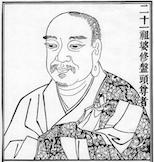Koso Wasan 18
The mind that aspires to attain Buddhahood
Is the mind to save all sentient beings;
The mind to save all sentient beings
Is true and real shinjin, which is Amida's Benefiting of others.
Parinama

The phrase 'the mind seeking to save all sentient beings' is not actually found in Bodhisattva Vasubandhu's Treatise on the Pure Land but it seems that Shinran was developing upon the following quotation:
How do we transfer merits? Not forsaking all the suffering beings, we aspire in our mind continually. We realise the great compassionate mind in order to transfer merits as a principal purpose.1
The transfer of merits (eko, Sk. parinama) is a very strong theme in Vasubandhu's Treatise, and with good reason. The transfer of merits is ubiquitous in the Buddhist world. Why?
Firstly, let us consider the principle of anatman, no self. It seems to me that there are two consequences of this immutable truth. The first is that because beings are all qualified by this same reality - and because anatman attests to the fact that our sense of isolation is illusory - all things are inextricably inter-connected. In other words: the underlying reality of existence to which anatman attests - is compassion. The person who is entering upon the first stage of enlightenment begins to experience a collapse in the illusion of a permanent and immutable self, and a concommitant rise in compassion, whereby he or she sees as others see, feels as others feel, and knows as others know.
A further aspect of anatman (not self) is its practical expression, which is unconditional generosity. Merits made in the course of Buddhist practice inevitably benefit both the practicer of the dharma and all other beings - no matter how unworthy they may be - because of the truth of anatman, and inter-connectedness. This is maitri, loving-kindness. Conditional generosity is not generosity at all; and it is not based on prajna or emptiness (Sk. shunyata) - as the prajñaparamita literature repeatedly reminds us.
Even at a mundane level separation and isolation is impossible; our actions always impinge on others and we are dependent on myriad contributors for our survival - from the microbes that help to digest our food to the parents who gave us life. Solipsism is a shallow illusion. While each of us, of course, is utterly unique, paradoxically we all participate in an order characterised by mutual inter-dependence. Even the most heroic post-modern epitome of individual self-sufficiency is not free from this reality.
Shinran Shonin tells us that the Larger Sutra of Infinite Life is the 'True Teaching'. This, of course, is principally due to the expression of the Primal Vow which it reveals. Nevertheless, the entire sutra is built upon the solid foundation of the transfer of merits and is indispensible for our entry into an appreciation of the true depths of the dharma. We learn in it that Amida Buddha is, perforce, pure merit; that as a fully enlightened being his perfection of wisdom is complete; that he is free of all defilement and delusion; that, as a result, his compassion is perfect, too. His 'transfer' of merits then - to all, even the 'undeserving' - is inexorable. The only way that we can evade it is to resist it by doubt or stubborn resistance.
Heartfelt nembutsu arises, when surrender absolutely to its overwhelming power.
1: RTS VI, p. 38.